<Back to Index>
- Lieutenant General of the Bulgarian Army and Minister of Defence Mihail Savov, 1857
- Lieutenant General of the Bulgarian Army and Minister of Defence Ivan Fichev, 1860
- General of the Bulgarian Army Vasil Ivanov Kutinchev, 1859
PAGE SPONSOR
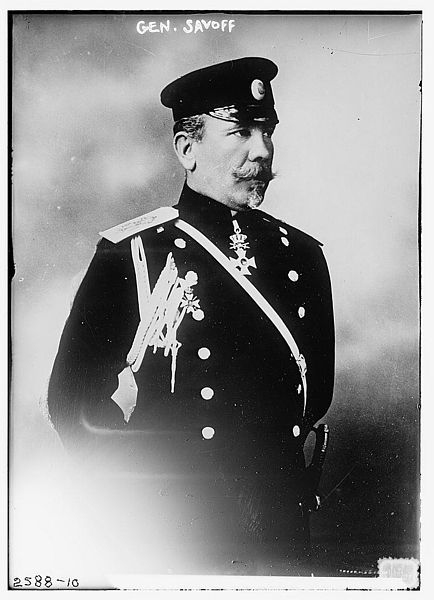
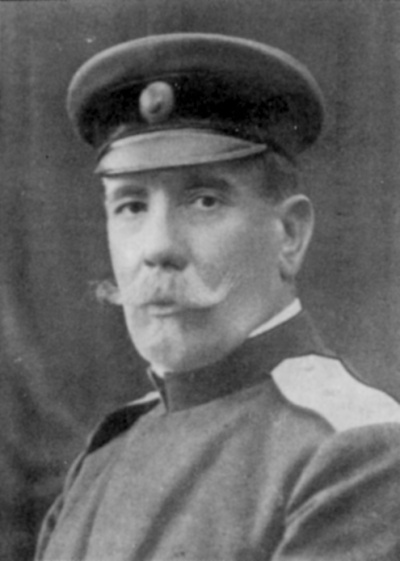
Mihail Savov (Bulgarian: Михаил Савов) (14 November 1857, Stara Zagora - 21 July 1928, Saint - Vallier - de - Thiey, France) was a Bulgarian general, twice Minister of Defence (1891 - 1894 and 1903 - 1907), second in command of the Bulgarian army during the Balkan Wars.
He was twice dismissed from the army and twice reassigned with the help of Tsar Ferdinand. Mihail Savov and Ferdinand are considered the main officials responsible for the Bulgarian defeat in the Second Balkan War.
Mihail Savov was born on 14 November (26 November NS) 1859 in Stara Zagora, at that time under Ottoman rule. He studied in Haskovo, Plovdiv, in the Aprilov National High School in Gabrovo and then in the Imperial lyceum Galasaray in Istanbul (1876).
He graduated from the Military School in Sofia in 1879 at the rank of Lieutenant. On 9 July 1881 he was promoted to First Lieutenant and then continued his education in the Nicolas General Staff Academy in Saint Petersburg (1881 - 1885).
After his return to Bulgaria he was appointed in the Eastern Rumelia militia. On 9 September 1885 he was promoted to Captain and with Order №4 of Knyaz Alexander Batenberg on the same day he was appointed as Adjutant in the army.
During the Serbo - Bulgarian War in 1885 he was appointed as head of one of the departments of the Ministry of Defense and commanded the left flank during the battle of Slivnitsa. He participated in the defeat of the Serbian Morava Division and in the successful battle of Pirot. He was awarded the Order of Bravery III grade.
In 1886 he participated in the commission for the settlement of the Bulgarian - Ottoman border in the Rhodope Mountains and served at the headquarters of the Minister of Defense. Between 1886 and 1887 he was assistant of the Defense Minister. On 17 April 1887 he was promoted to Major and worked in the Department of the General Staff as officer in the 5th infantry brigade.
In 1887 Mihail Savov was appointed as Fligel Adjutant of Knyaz Ferdinand. On 16 February he became Minister of Defense in the cabinet of Stefan Stambolov and on 2 August in the same year was promoted to Lieutenant Colonel. After the fall of Stambolov in 1894 he was dismissed from the army but in 1897 his position was restored and became director of the Military School until 1903. On 1 January 1899 he was promoted to Colonel.
Between 1903 and 1908 Savov was again Minister of Defense in the third cabinet of Stoyan Danev, in the second cabinet of Racho Petrov and in the cabinets of Dimitar Petkov, Dimitar Stanchov and Petar Gudev. On 1 January 1904 he was promoted to Major General. In 1907 he was charged for corruption and malpractice regarding the supply of weapons.
On 30 October 1908 he was promoted to Lieutenant General and left the army for a second time.
After the First Balkan War broke out in 1912 General Savov was restored to service and was appointed on the newly created position of Assistant to the Commander (Tsar Ferdinand). On his orders the Bulgarian army attacked the Ottoman defense lines at Chatalja despite the fact that the Bulgarians were outnumbered, their supply lines were overstretched and there was a cholera outbreak among the troops. He also ordered the attack against the Serb and Greek armies which flamed the Second Balkan War in 1913.
On 29 June 1913 he was put in command of the united 4th and 5th Armies and on 14 July the 2nd Army also joined the effort under his command. He was one of the commanders at the battle of Kresna Gorge. After the war he was again dismissed and put on trial at the State Court in 1914.
In subsequent years Mihail Savov lived in France. After the First World War he became Minister Phenipotentiary in France (1920 - 1923) and Belgium (1922 - 1923).
Lieutenant General Mihail Savov died on 21 July 1928 in Saint - Vallier - de - Thiey in France and was buried on 18 August in Sofia.
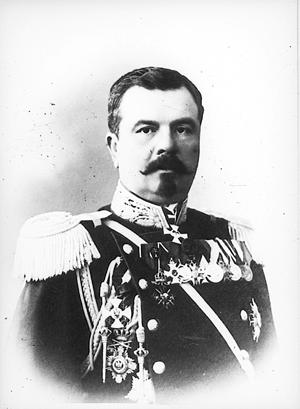
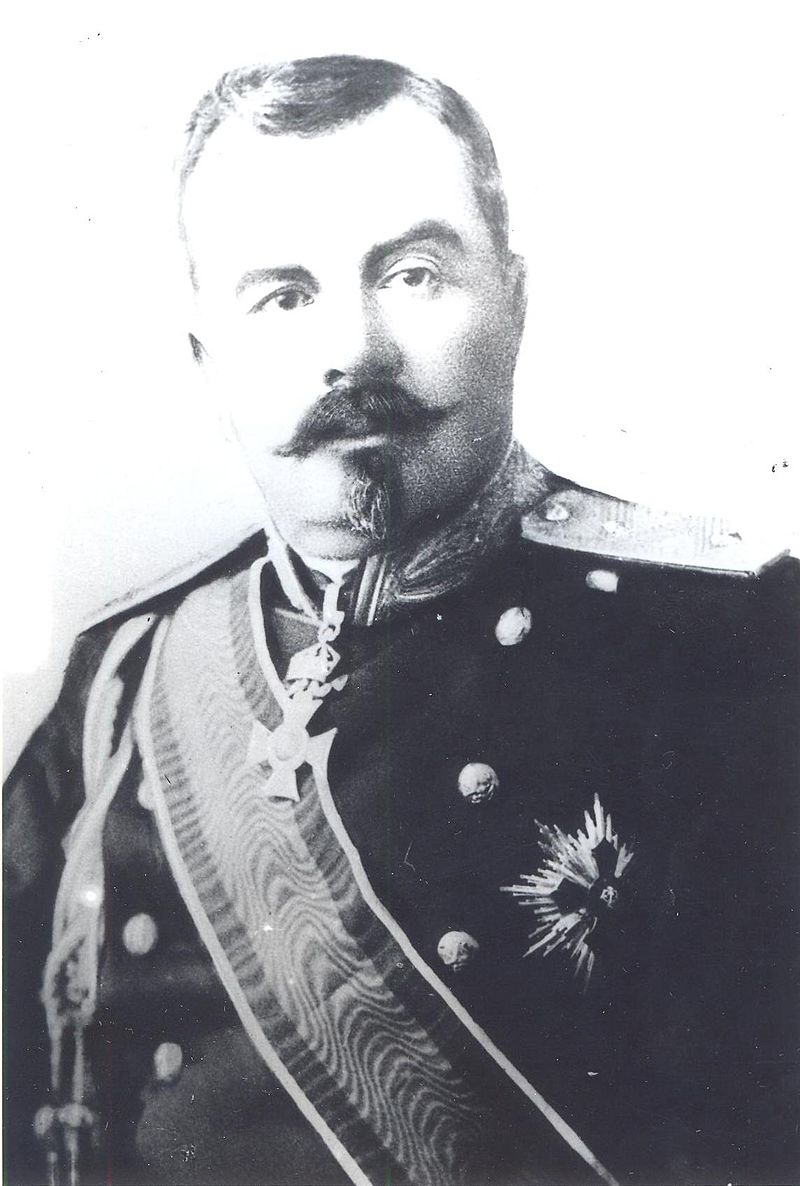
Ivan Fichev (Bulgarian: Иван Фичев) (15 April 1860, Tarnovo - 13 November 1931, Sofia) was a Bulgarian General, Minister of Defense, military historian and academician.
Ivan Fichev was born in 1860 in Tarnovo, at that time part of the Ottoman Empire. He was a grandson of the famous architect from the National Revival, Kolyu Ficheto. Fichev studied in Tarnovo, Gabrovo and in Robert College in Istanbul.
During the Russo - Turkish War (1877 - 1878) he participated in the Bulgarian volunteer corps and later served as translator for the temporary Russian governors in Gabrovo and Tarnovo. In 1880 he was accepted in the Military School in Sofia and graduated in 1882 at the rank of lieutenant and was assigned to serve in the 20th Varna infantry battalion. In August 1885 he was promoted to First Lieutenant.
During the Serbo - Bulgarian War in 1885 he was a commander of the 2nd Company in the 5th Danube Regiment and participated in the defense of Vidin between 12 and 16 November.
In January 1887 he was promoted to the rank of Captain and in 1898 graduated from the Military Academy in Torino, Italy. On 1 January 1892 he was promoted to Major and on 1 January 1903 to Colonel. From the beginning of 1907 he was appointed a commander of the Second Thracian Infantry Division based in Plovdiv and on 1 January 1908 promoted again to Major General. From 1910 to 1914 he was the Chief of the General Staff of the Bulgarian Army, which spanned the time of the two Balkan Wars, and as such, was responsible for devising the general plan for the war against the Ottoman Empire.
During the First Balkan War (1912 - 1913) he was the head of the operations in Thrace and fought in the successful battles at Lozengrad and Lule Burgas but after the Bulgarian advance was repulsed at Chataldja only 20 km from the Ottoman capital he fell into disgrace. He was one of the Bulgarian delegates during the negotiations that lead to the signing of the Chataldja Armistice on 3 December [O.S. 20 November] 1912. In May 1913 Fichev resigned from his post in protest against the declaration of war on Bulgaria's former allies but his resignation was not accepted and during the Second Balkan War he remained at the post of Chief of the General Staff of the Army. He also signed the Bucharest Peace Treaty as part of the Bulgarian delegation during the negotiations.
After the Balkan Wars he continued to serve as Chief of the General Staff of the Army. On 1 January 1914 he was promoted a Lieutenant General and two weeks latter was appointed commander of the 3rd Military District. On 14 September that year he was appointed a Minister of War and served as such until August 1915 when he went into the reserve. After the First World War he was Minister Plenipotentiary to the Romanian capital Bucharest.
Ivan Fiched died on 13 November 1931 in Sofia.
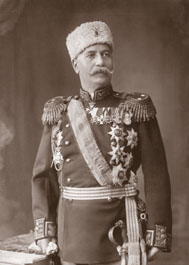
Vasil Ivanov Kutinchev (February 25, 1859, Ruse - March 30, 1941) was a Bulgarian officer. He began his military career in 1879 after graduating from the Military School in Sofia . On 13 September 1885 he was made commander of the 1st battalion of the 5th "Dunav" infantry regiment.
He took part in the Serbo - Bulgarian War of the same year and on 8 November was promoted to commander of the 5th regiment. Captain Kutinchev fought in the Battles of Slivnitsa, Dragoman, Tsarevbrod and Pirot.
After the war he served as commander of various infantry regiments and was promoted to Major General in 1904. Four years latter Kutinchev was appointed commander of the First Army Region which comprised the western parts of Bulgaria.
On 2 August 1912 Tsar Ferdinand in honor of the 25th anniversary of his arrival to Bulgaria promoted six Major Generals to the rank of Lieutenant General. One of those generals was Kutinchev. This is the first time in the history of the Bulgarian Kingdom when such high ranks were awarded to officers of the Active Army. Until then it was given to officers of the reserve.
With the outbreak of the First Balkan War General Kutinchev was made commander of the First Army which took part in the important battles of Kirk Kilisse, Lule Burgas and Chataldzja.
After the end of that war the entire army had to be transferred to Northwestern Bulgaria, where during the Second Balkan War it saw service against the Serbs. Meanwhile on 16 July 1913 Kutinchev took the command of Second Army. On this post he remained until the end of hostilities.
During the First World War
he was a general in the General Staff of the Active Army
and commander of the newly created Army Region of Morava.
In one final act of recognition of his service in October
1918 Lieutenant General
Vasil Kutinchev was promoted to General
of the Infantry which was the highest military rank in the
Bulgarian Army and went
into the reserve. He died in Sofia in 1941.